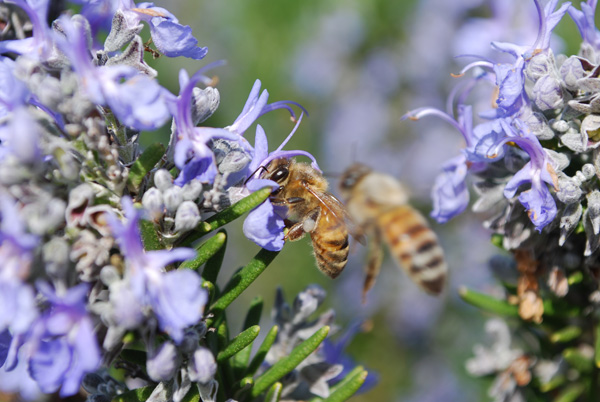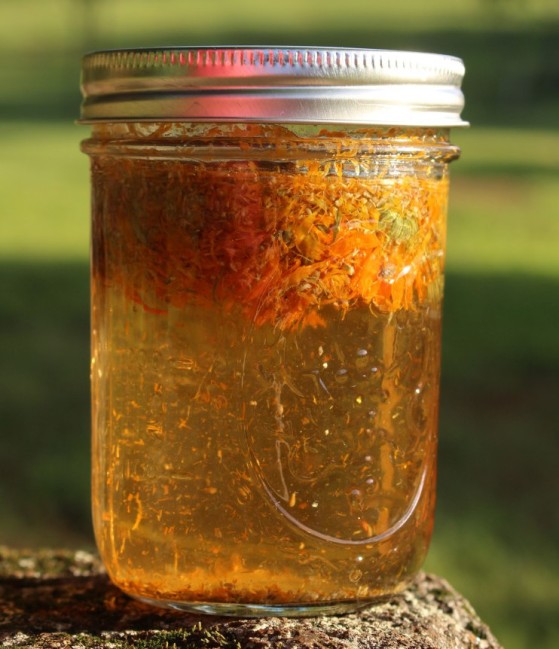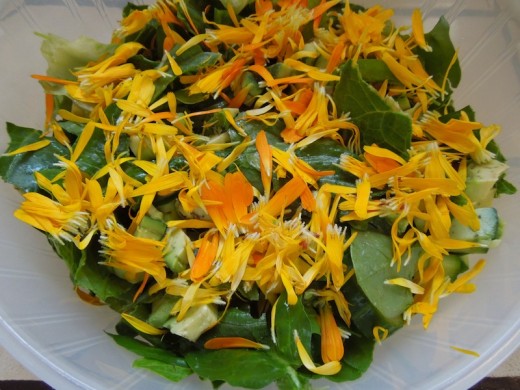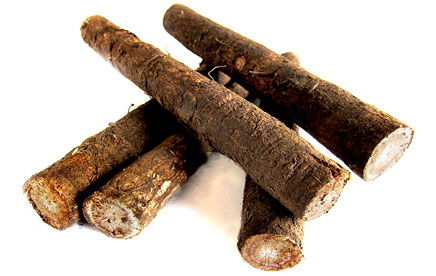Background
Naming
- Botanical Name: Rosmarinus officinalis
- Other Names: Rose of Mary, Rosmarine, Incensier
- Etymology: The name “rosemary” comes from Latin ros (dew) and marinus (“sea”), or “dew of the sea.” Rosemary was said to have been draped around Aphrodite’s neck when she rose from the sea.

Growth
- Appearance: Native to the Mediterranean and Asia, Rosemary is a perennial evergreen. Its leaves are approximately 1 inch long and needle-like. Its flowers range from white to pink to blue. Rosemary is easy to grow and pest-resistant.
- Cultivation: Rosemary prefers fertile soil and full sun, but some shade is alright. It should be watered thoroughly and shouldn’t be allowed to dry out between waterings, but it shouldn’t be given so much water that its roots sit in a pool. Rosemary Gladstar suggests misting Rosemary leaves with a diluted sea weed spray weekly. Despite its evergreen-like appearance, the plant will die in temperatures below 40ºF and must be brought inside or covered. Rosemary is used to the breezy Mediterranean and will need a fan and a humidifier if it’s being grown indoors.
- Parts used: Leaves, oil
History
- Mythology: When the Virgin Mary lay her coat over a white rosemary bush to rest, the flowers turned blue
- Symbolism: remembrance, female power, love, fidelity
- Traditional Uses: memory loss, hair loss, weddings, love, divination, repelling nightmares, repelling witches

+ + +
Medicinal and Practical Uses
- Safety: Avoid using rosemary essential oil while pregnant, if epileptic, or with high blood pressure.
- Characteristics: Hot, dry, diffusive
- Primary actions (Secondary actions): Adaptogen, aromatic, astringent, tonic nervine, (analgesic, carminative, deodorant, mild emmenagogue, hypertensive, stomachic)
- Constituents: Rosmaricine
Circulation
- Increased blood pressure: Rosemary can increase blood pressure and circulation. Use with caution if you already have high blood pressure.
- Varicose veins: Increased blood pressure may help decrease the appearance of varicose veins, which are caused by blood pooling when veins lose elasticity.
Digestion
- Indigestion relief: Rosemary can provide relief for indigestion and its symptoms (bloating, constipation, diarrhea, flatulence). When consumed, rosemary acts as an appetite stimulant and aids in digestion.
Mind/Body
- Mental stimulant: Rosemary’s ties to remembrance aren’t purely symbolic. It can act as a mental stimulant, potentially helping you remember better or at least feel uplifted. Rosemary should be used a few hours before bed as its stimulating properties can delay sleep.
- Sore muscle and pain relief: When rosemary essential oil is applied topically as part of an oil or salve, it may increase circulation and alleviate pain associated with arthritis and sore muscles, including menstrual cramps.
- Stress relief: Rosemary can help alleviate stress when applied topically, used in aromatherapy, or consumed.
Non-Body
- Preservative: Rosemary can be used to extend the shelf life of perishable items.
- Pest repellant: There are very few bugs or animals that like the smell of rosemary. Grow it in your garden, keep a few springs in your kitchen, or use essential oil in your bug sprays to keep pests away.
- Air freshener: Fresh rosemary, rosemary incense, or a few drops of rosemary essential oil in boiling water can get rid of bad smells.

Respiratory system
- Respiratory relief: Rosemary may provide many types of respiratory relief. Rosemary essential oil may be used in aromatherapy to help ease asthma, congestion, and allergies.
Skin and Hair
- Hair loss and dandruff: Rosemary stimulates hair follicles, which leads to healthy hair growth. It may delay hair loss, promote hair growth, or ease dandruff. Add a few drops of essential oil to shampoo or create an infusion to use as a rinse.
- Soft skin: Rosemary oil rarely causes adverse reactions when applied topically. It can help soften skin.
- Acne: Rosemary essential oil’s tendency to tone skin and tighten pores may help clear up acne more quickly.
*I write about uses for plants as a novice herbalist, not a doctor or scientist; this isn’t medical advice. If you want to use plant-based remedies, find a doctor you trust and respect who also trusts and respects you so that you can work together to make sure you’re the healthiest version of you.
+ + +
Cooking

- Flavor: Rosemary grows year-round but is milder when its picked in the winter than the summer.
- Cuisines: Rosemary is widely used in Mediterranean and other Western European cuisines, specifically Italian and French.
- Soup: Rosemary is a key ingredient in boquet garni, a bundle of herbs that’s used to prepare soup. Fun fact: it used to be called a “faggot” since it’s a bundle of sticks, but that went out of fashion, for obvious reasons.
- Compliments: Rosemary goes especially well with garlic and onions, meats, olive oil, and potatoes.
+ + +
Perfumery
Aroma: Strong, fresh, camphor-like and with a woody-balsamic undertone
Note: Middle
Blends Well With: Basil, bergamot, black pepper, cedarwood, cinnamon, citronella, clary sage, elemi, eucalyptus , frankincense, geranium, grapefruit, lavender, lemon, litsea cubeba, mandarin, marjoram, niaouli, oregano, peppermint, petitgrain, pine, ravensara, tea tree, thyme
+ + +
Sources























